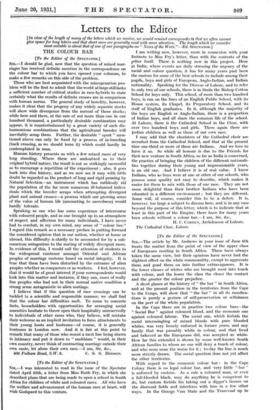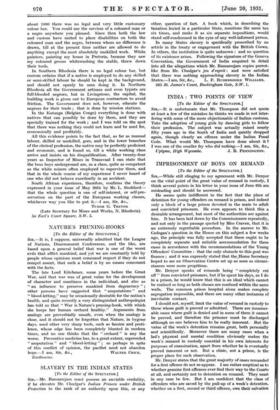[To the Editor of the SPECTATOR.]
SIR,—The article by Mr. Andrews in your issue of June 6th treats the matter from the point of view of the upper class of Europeans residing in South Africa. These have always taken the same view, but their opinions have never had the slightest effect on the white commonality, except to aggravate them and goad them on into further extravagances. It is the lower classes of whites who are brought most into touch with colour, and the lower the class the closer the contact and the greater the colour prejudice.
A short glance at the history of " the bar " in South Africa, and at the present position in the territories from the Cape to the Congo, will show that " the bar " in all its ramifica- tions is purely a gesture of self-preservation or selfishness on the part of the white population.
In the Cape there are in practice two colour bars—the `‘ Social Bar " against coloured blood, and the economic one against coloured labour. The social one, which forbids the social intermingling of mixed bloods with pure blooded whites, was very loosely enforced in former years, and any family that was passably white in colour, and that lived and behaved as the Europeans did, was accepted as white. How far this extended is shown by some well-known South African families to whom no one will deny a touch of colour, and who seem none the worse for it ; to-day the line is much more strictly drawn. The social question does not yet affect the other territories.
With regard to the economic colour bar : in the Cape Colony there is no legal colour bar, and very little " bar " is enforced by custom. As a rule a coloured man, or even a full-blooded black, may do anything he is competent to do, but custom forbids his taking out a digger's licence on the diamond fields and interferes with him in a few other ways. In the Orange Free State and the Transvaal up to about 1890 there was no legal and very little customary colour bar. You could use the services of a coloured man or a negro anywhere you pleased. Since then both the law and custom have united to place disabilities on both the coloured man and the negro, between whom no difference is drawn, till at the present time neither are allowed to do anything except the most absolutely unskilled work. White painters, painting my house in Pretoria, because they saw my coloured groom whitewashing the stable, threw down their tools.
In Southern Rhodesia there is no legal colour bar, but custom ordains that if a native is employed to do any skilled or semi-skilled labour he should be kept in the background, and should not openly be seen doing it. In Northern Rhodesia all the Government artisans and even typists are full-blooded negroes, but in Livingstone, the capital, the building work is given out to European contractors to avoid friction. The Government does not, however, educate the negroes for their trade ; that is done by mission stations.
In the Katanga (Belgian Congo) everything is done with natives that can possibly be done by them, and they are specially trained for the work ; and I was told on the spot that there was nothing they could not learn and be used for, economically and profitably.
All this evidence points to the fact that, as far as manual labour, skilled or unskilled, goes, and in the lower branches of the clerical profession, the native may be perfectly proficient and economic, and is found so, till a white working class arrive and insists on his disqualification. After twenty-four years as Inspector of Mines in Transvaal I can state that the boss boys underground are, as a class, quite as competent as the white miners often employed to supervise them, and that in the whole course of my experience I never heard of one who did not behave excellently in an accident.
South African experience, therefore, confirms the theory expressed in your issue of May 80th by Mr. L. Stoddard— that the whole question is one of self-interest, or self-pre- servation on the part of the European working classes, whichever way you like to put it.—I am, Sir, &c.,
TUDOR G. TREVOR
(Late Secretary for Mines and Works, N. Rhodesia). 5a Earl's Court Square, S.W. 5.











































 Previous page
Previous page